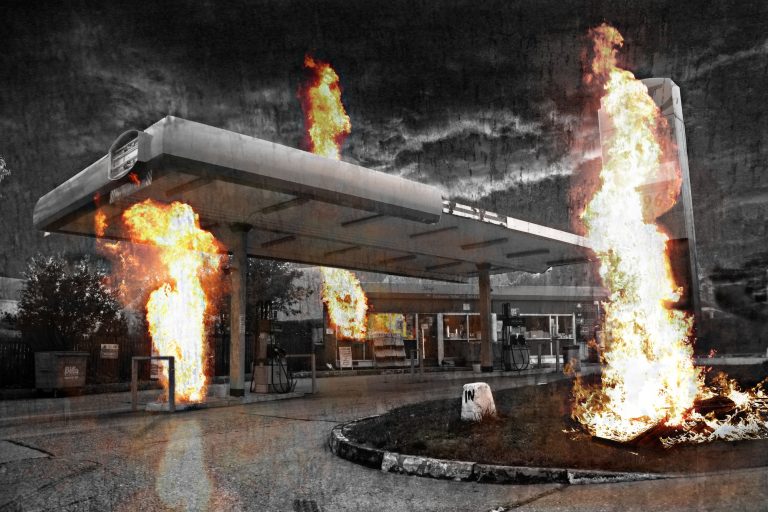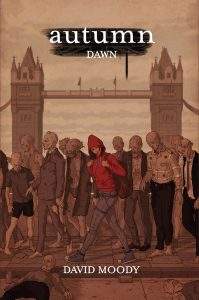Donna Yorke
A normal morning at work descends into chaos for Donna Yorke. From nine floors up she watches the world below her die.
An excerpt from the opening chapters of AUTUMN: THE CITY.

For most of the last forty-eight hours, Donna Yorke had hidden under a desk in a corner of the office where she’d worked since the summer. On Tuesday morning, without any warning, her familiar surroundings had become alien, nightmarish. On Tuesday morning she watched the world around her die.
Along with the rest of her colleagues, Donna worked an early shift one week in four. This week it had been her turn to get in first and open the post, switch on the computers and perform various other simple tasks so that the rest of her team could start processing as soon as they arrived at their desks at nine. She was glad it had happened so early in the day. As it was she’d only had to watch four of her friends die. If it had happened just half an hour later she’d have had to watch the other sixty-or-so people in the office suffer the same sudden, inexplicable, suffocating death. None of what had happened made any sense. She was cold and alone, and too terrified to even start trying to look for answers.
From her ninth-floor vantage point she watched the destruction wash across the world outside like an invisible tidal wave. Being so high above the city she hadn’t heard anything, and the first sign that anything was wrong had been a bright explosion in the near distance, perhaps a quarter of a mile away. She’d watched with morbid fascination and genuine concern as a plume of billowing fire and dense black smoke had spewed up into the air from the gutted remains of a burning petrol station. The cars on the road nearby were scattered and smashed. Something huge had clearly ploughed through the traffic, crossed the dual carriageway and crashed into the pumps, immediately igniting the fuel stores. Had it been an out-of-control lorry or tanker perhaps?
But that had been just the beginning, and the horror and devastation which followed had been relentless, and on a truly unimaginable scale. All across the heavily industrialised east side of the city she had seen people falling to the ground, writhing and squirming, then dying. And more vehicles were stopping too – many crashing into each other and blocking the roads, others just slowing to a gradual halt, as if they’d run out of fuel. Donna watched as the chaos moved nearer, like a shock wave, rolling relentlessly across the city below her towards her building. Her legs felt strange, heavy, as she stumbled back and looked around for someone who could offer explanations and reassurance.
One of her colleagues, Joan Alderney, had just arrived to start work, but by the time Donna found her, she was on her hands and knees, her body shaking, and fighting for breath. Joan looked up at her with huge, desperate eyes, as her face turned ashen, drained to an oxygen-starved blue-grey. Her lips remained crimson-red, stained by blood from the numerous swellings and sores which had erupted in her throat.
As Joan lay dying on the ground next to her, Donna was distracted by the sound of Neil Peters, one of the junior managers, collapsing across his own desk, showering his paperwork with spittle and blood as he retched and choked and fought for air. Jo Foster, one of her closest friends at work, was the next to be infected as she walked into the office. Donna watched helplessly as Jo clawed at her neck, unable to speak, but mouthing a silent scream of terror before falling, dead before she’d even hit the floor. Finally, Trudy Phillips, the last member of this week’s early shift, arrived, panicked, and began to stumble towards Donna as the searing pain in her throat started. She had moved only a few yards forward before she lost consciousness and collapsed, catching a cable with her foot and dragging a computer monitor off a desk. It crashed to the ground just inches from her face, but she was oblivious. Once the sound had faded and Trudy had died, the world had become terrifyingly quiet.
Donna’s instinctive reaction was to get out of the office and look for help, but as soon as she was outside she regretted having moved. The lift provided a brief enclosed haven of normality as it carried her down to the ground floor lobby, but the sliding doors opened to reveal a scene of death and destruction on an incomprehensible scale. There were bodies all around the lobby. The security guard who had flirted with her less than half an hour ago was dead at his desk, slumped forward with his face pressed up against a CCTV monitor. One of the senior office managers – a short, overweight man in his late forties called Woodward – was trapped in the revolving door at the very front of the building, his heavy gut wedged against the glass. Jackie Prentice, another one of her work friends, was sprawled on the floor just a few yards away from where Donna stood, buried under the weight of two men, both dead. A thick, congealing dribble of blood spilled from Jackie’s open mouth, gathering in a sticky pool around her blanched face.
Without thinking, Donna pushed her way out through a side door and onto the street. Beyond the walls of the building the devastation appeared to have continued for as far as she could see in every direction. Whichever way she looked, there were hundreds of bodies. Numb, unable to think clearly, she walked away from the building and further into town. As she approached the main shopping area, the number of bodies increased, until the pavements were completely obscured in places, carpeted with a still-warm mass of tangled corpses.
Donna had assumed that she would find others like her: people who had survived the invisible killer. It seemed unlikely – impossible even – that she could be the only one who was left alive, but after almost an hour of picking her way through the dead and shouting for help, she had heard nothing and seen no one. She kept walking for a while longer, convinced that she might turn the next corner and find everything back to normal, as if nothing had happened, but the ruination was apparently without end. Numbed by the incomprehensible magnitude of the inexplicable catastrophe, she eventually gave up, turned around, and made her way back to the tall office block.
The family home was a fifty-minute train journey away, more than two and a half hours’ drive by car. She could have gone back to her flat, but there didn’t seem to be much point. Donna had chosen to live, study and work in a city more than a hundred and fifty miles away from virtually everyone she knew; she had been three months into a one-year work experience placement from business school. What she would have given to have been back with her parents now, in their nondescript little three-bedroom semi-detached house on the other side of the country – but what would she have found there? Had the effects of whatever happened here reached as far as her home town? Had her parents survived like she had, or would she have found them dead too? She couldn’t bear to think about what might or might not have happened to them.
The fact of the matter was, she eventually forced herself to accept, she was where she was and there was very little she could do about it. As impossible and unbelievable as her circumstances now were, she had no option but to try and pull herself together, and find somewhere safe to sit and wait for something –anything – to happen. And the most sensible place to do that, she decided, was back in her office. Its height provided some isolation, she knew the layout, and it was clean, spacious and relatively comfortable – and she knew there would be food and drink in the staff restaurant. Best of all, security in the office was tight. Access to the working areas was strictly controlled by electronically tagged passes, and from a conversation she’d had with an engineer who’d been running tests last week, she knew that the security system itself ran independent of the mains supply – so regardless of what happened to the rest of the building, power to the locks would remain constant, and that meant that she would be able to securely shut out the rest of the world until she was ready to face it again. The advantage might only have been psychological, but it was enough. During those first few long hours alone, that extra layer of security meant everything to her.
Much of the rest of the first day had been spent reconnoitring the building and collecting basic necessities from several of the closest city centre shops. As well as some warmer clothes, she picked up a mattress, a sleeping bag and gas lamps from a camping store, enough food and drink to last her a while, and a radio and portable TV. By early evening she had carried everything up the many flights of stairs (she’d avoided the lifts – what if the power failed and she got stuck?) and had made herself a warm and comfortable nest in the furthest corner of her office. As the light faded at the end of the first day she tried every possible means to make contact with the outside world. Her mobile phone didn’t work, and she couldn’t get anything more than a dialling tone on any of the office phones (and she tried more than twenty different handsets), nor could she find anything other than static and silence on the radio and television. The streets lights around the building came on as usual, but with no one else left alive, the rest of the city remained ominously dark. Eventually Donna gave up trying and buried her head under her pillow.
That first night took an eternity to pass, and the second day was even longer. She only emerged from her hiding place when she absolutely had to. Just after dawn she crept around the perimeter of the office and looked down onto the streets below, at first to check whether the situation had changed, but also to confirm that the bizarre events of the previous day actually had taken place. During the dragging hours, Donna had begun to convince herself that the death of many thousands of innocent people couldn’t really have happened so swiftly, so viciously, and for no apparent reason.
From where she was hiding underneath the desk, Donna caught sight of her dead friend Joan Alderney’s outstretched right foot. Seeing the woman’s corpse unnerved her so much that she couldn’t tear her eyes away: the close proximity of the body was a constant, unwanted reminder of everything that had happened. Eventually she plucked up enough courage to do something about it. Fighting to keep her emotions and nausea in check, she dragged the bodies of each of her four work colleagues down to the post-room, one at a time. The corpses were all stiff, contorted with rigor mortis. She laid them side by side and covered them with a large dust sheet she’d found on another floor, where decorators had been working.
The third morning began in as bleak and hopeless a manner as the second day had ended. Feeling slightly more composed, Donna crawled out from her nest underneath the desk and sat down in front of the computer that she used to use, staring at the monochrome reflection of her face in the empty screen. She had been trying to distract herself by writing down song lyrics, addresses, the names of the players in the football team she supported, and other bits of information, when she heard something – the first noise in days – coming from the far end of the office floor. It was a tripping, stumbling, crashing sound, and she jumped up immediately, with equal measures of unexpected hope and sudden concern. Was her painful isolation about to be ended? She crept cautiously towards the other end of the rectangular-shaped office, her heart pounding.
‘Hello,’ she said, her voice sounding uncomfortably loud, though she’d spoken in little more than a whisper, ‘is anybody there?’
There was no response, and she took a few steps further forward, then stopped when she heard the noise again. It was coming from the post-room. Donna pushed open the heavy swinging door—
—and she stood and stared. Neil Peters – the manager she had watched fall and die in front of her just two days earlier – was moving. Swaying unsteadily on clumsy, barely coordinated feet, the dead man was dragging himself across the room, thumping heavily into the wall, then turning around awkwardly and walking the other way. Instinctively Donna reached out and grabbed hold of him. ‘Neil?’
The body stopped moving when she held it. There was no resistance or reaction; it just stopped. She looked deep into Neil’s emotionless face. His skin was tinged with an unnatural green hue and his eyes were dark and misted, the pupils fully dilated. His mouth hung open: his lips were puffed and cracked and his tongue swollen like an oversized slug. His chin and neck appeared bruised, flecked with dried blood. Petrified, Donna released her grip and her dead manager immediately began to move again. He tripped over one of the other three bodies on the floor, then slowly picked himself up. Donna stumbled back out through the doors, which swung shut after her, trapping the moving corpse inside. She looked around until she spotted a large filing cabinet, and she pulled it until it overbalanced, crashing down in front of the door and blocking the way out.
For a while Donna stood there, numb with disbelief, watching through the door’s small glass window as Neil Peters’ corpse staggered around the room, never stopping. Occasionally the body turned and moved in her direction, when the dry, unfocused eyes seemed to look straight through her.
Breathing hard, trying to quell her rising panic, Donna left the office floor and walked out to the stairs to put some distance between herself and what she’d just seen. The corpse of the office secretary, Sylvia Peters, was lying in front of her, spread-eagled across the landing, exactly where she’d died earlier in the week. As she neared the body, a slow but very definite movement caught her eye: two of the fingers on the dead woman’s left hand trembled and occasionally spasmed, clawing at the floor involuntarily.
Now sobbing with fear, Donna ran back towards her hiding place on the ninth floor, but she stopped at the window to look down onto the world below. Even from so high up she could clearly see the same bizarre, illogical – impossible – thing was happening, again and again, down at street level. Most of the bodies remained motionless where they’d fallen, but others were now moving, defying all logic. Bodies which had lain motionless for almost two days were moving, albeit without any real degree of control.
Donna collected together her things and hurriedly made her way to the tenth floor – she’d found no bodies up there when she’d first checked the building. On her second journey, she realised that Sylvia Peters’ body had gone.
PREVIOUS STORY | INDEX | NEXT STORY










